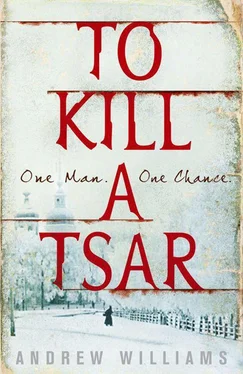‘Please,’ she said, edging her small frame between two large babushkas who were sitting as close to the heat from the stove as was humanly possible. The rough telegram paper was still in her pocket. Scrunching it in her little hand, she opened the fire door with the sleeve of her coat and threw the ball of paper into the flames. Fourth coach. Second train. She would be in Moscow by the morning.
They had argued for some time over who should have the honour. In the end they decided that to avoid the suspicions of the neighbours Lev Hartmann and Sophia Perovskaya would connect the wires. Anna was to observe the explosion from a clump of bushes a little way from the track. In the first hours after her return to Moscow the question of who would detonate the mine seemed academic. Surely when word of Goldenberg’s arrest and the dynamite haul reached St Petersburg the Third Section would put two and two together and stop the imperial train? The atmosphere was tense and gloomy as Anna had known it would be when she tramped across the snowy wasteland to the cottage with her news. The burden of Grigory Goldenberg’s arrest had weighed heavier on her shoulders than a sack of dynamite.
‘Will he speak?’ Sophia Perovskaya had asked her. ‘You know him better than me, Annushka.’
Anna did not know what to say. Until tested, who could be sure they had the inner resources to withstand isolation, interrogation, torture? They had talked for many hours about what they should do and resolved to press on regardless, working day and night to complete the tunnel. The gallery kept flooding and they were forced to bail, a tight human chain along its length from the face to the cellar. At the end of each shift the work teams collapsed, exhausted and muddy, on to the pallets that were scattered about the house. Anna and Sophia forced them to eat and brought them warm water to bathe. Nerves were frayed, and it took the quiet determination of both women to drive the tunnel the last few yards to the track. Alexander Mikhailov had sent a cryptic few lines from the city, urging them to finish the work by the evening of November the 17th and promising to visit the cottage as soon as he was able. But his silence worried them all. Sophia Perovskaya learnt in casual conversation with one of their neighbours that the gendarmes had stepped up patrols along the railway and were carrying out house to house searches. On the evening of the 16th there was a loud banging on the door. Perovskaya snatched her pistol from the table and stepped closer to the bottle of nitroglycerine.
Shivering on the doorstep was a drunken neighbour who had taken such a skinful he was unable to find his way home. Hartmann took him by the arm and led him through a heavy snowfall to his cottage, where he received a hot reception from his wife.
They finished the tunnel on the afternoon of the 17th and sat around the samovar with their own exhausted thoughts. Alexander Mikhailov joined them at dusk, brushing the snow from his beard and black fur-lined coat, his cheeks boyish pink with the cold.
‘Well?’ he asked, slapping his gloves on the table.
‘It’s done,’ Sophia Perovskaya replied.
‘And the mine?’
‘In place.’
‘Good,’ and he beamed at them all like an avuncular older brother. His gaze rested on Anna: ‘And you? I’m sorry about Grigory. They won’t break him. He’s strong.’
‘Yes.’
‘First a toast.’ Mikhailov reached down to the bag at his feet and lifted out a bottle of vodka. ‘Glasses, please.’
And there was more: fresh bread, smoked fish and caviar, cold meats and cheeses and three bottles of Georgian wine.
‘To our work,’ said Mikhailov, lifting his glass to the men and women patiently waiting on his word. ‘The tsar has left the Crimea.’
Silence at the table. Mikhailov raised his glass again, making eye contact and saluting all of them in turn. After weeks of toil and anxiety the moment was almost upon them.
‘How can you be sure?’ Hartmann asked at last.
‘I’ve received word from “the Director”. The imperial train will pass through Alexandrovsk tomorrow.’
‘And the others are ready there?’
‘Yes.’
Hartmann raised his glass of vodka to return the toast: ‘To the Director, whoever he is,’ and he drained it and poured himself another.
‘The security police are arresting progressives in every town between the Crimea and St Petersburg as a precaution,’ Mikhailov continued. ‘But the route is the same.’
‘And Grigory? Do you know what they’ve done with him?’ Anna asked.
‘He is still in Odessa. The head of the Third Section has been told of his arrest and of the dynamite. Security is tight but they haven’t cancelled the train.’
That night the cottage was still for the first time in weeks, the tunnel sealed, the candles extinguished, but sleep was harder than ever to come by. Anna lay at Sophia’s side, conscious of her warmth and the scent of her hair. A kaleidoscope of images played through her tired mind: the plough at the front of the imperial train forging on through a suffocating wilderness of white, its plume of steam against the night sky, and the tsar at his polished table with gleaming silver, the rich red velvet of his liveried servants. Then a blinding yellow flash and the empire turned upside down.
‘It’s for the greater good, you know,’ whispered Sophia beside her. ‘Only if he dies can we hope for freedom. I wasn’t sure at first…’ She turned on her side and felt with her tiny hand for Anna’s cheek and stroked it tenderly, so delicate, so childlike and yet so strong.
‘But I am sure now. He must die. We are doing a noble thing, Annushka, a noble thing.’
‘Yes,’ she said quietly. ‘Yes, I am sure we are.’
The following day Alexander Mikhailov — a plump raven in his black coat — was on the doorstep again and it was clear from his face as he kicked the snow from his boots that he was the bringer of bad tidings. There was fresh word from the Director; the imperial train had arrived safely in Kharkov.
‘It passed through Alexandrovsk. Something must have gone wrong,’ he said, warming his hands round a glass of tea. ‘There’s been no report of an explosion. Zhelyabov and the others may have been arrested. That leaves us, the Moscow cell. The Director says the train will reach us on the evening of the 19th — tomorrow.’
There was nothing they could do but wait and listen to the steady ticking of the simple kitchen clock. Mikhailov decided to wait with them. The security police were crawling over the Moscow stations like beetles on a dung heap: ‘And they’ve issued a book of photographs — of wanted revolutionaries — I think I’m on page two,’ he said, with a chuckle. ‘Sophia, you are in there too. I’m afraid none of the rest of you make it. But don’t worry, I’m sure you will after tomorrow.’
That night they held a little party, with Mikhailov the master of ceremonies: ‘To celebrate our liberty and the first giant step in the revolution.’ Hartmann played the accordion and they sang Russian folk songs and danced in the flickering candlelight.
‘Dance with me, Anna.’ Mikhailov grabbed her by the hand and pulled her to her feet. ‘The mazurka, Lev!’
He whirled her about the rough floor with aristocratic panache and she was too intoxicated by the dance and the excitement of what tomorrow would bring to care that he was squeezing her waist tightly and pressing her a little too close.
‘Huzzah, huzzah!’ they all cheered.
‘What a couple we make,’ he whispered.
And later, when she slipped out to clear her head, he followed her and offered her his fine fur-lined coat. She shook her head, but he insisted on placing it about her shoulders. As she stood in the sober night air listening to his talk of revolution and the people, one sad thought held her: nothing would be the same after tomorrow.
Читать дальше












